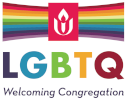Sermon by Dr. David Robins, January 20, 2008—Martin Luther King Sunday
In 1965, after walking in the Selma to Montgomery Alabama civil rights march with the Rev. Dr. Martin Luther King Jr., Rabbi Abraham Joshua Heschel was at the Montgomery airport trying to find something to eat before his flight left for New York city. A surly woman behind the snack counter glared at Heschel—his yarmulke and white beard making him look “ (very out of place in Protestant Alabama). She mockingly proclaimed, “Well. I’ll be damned. My mother always told me there was a Santa Claus, and I didn’t believe her until now.” She told Heschel that there was no food to be had at the airport.” (NYTimes, Edward Rothstein)
Now, it is certainly possible that there was no food left at the airport, as many civil rights marchers had come through the airport, all of them presumably hungry. On the other hand, it is more likely that she suspected he had been in Montgomery for the civil rights march, and she was not going to serve food to any weird looking northerner stirring up trouble in her town.
What would your response have been if you were Heschel in that situation? Picture yourself tired, hungry, emotionally stressed from the confrontations, the police, the taunts, the possible threats on your life. I would have had trouble being charitable or nice. I might have retorted angrily under my breath about Southern bigotry. I might have made a snide remark about Southern hospitality. I might have cast aspersions upon her city.
I doubt that I would have maintained a sense of humor.
This would seem to be a small, insignificant moment in time. Yet, Heschel treated the moment as a crucial conversation, a crucial confrontation.
- He treated it as a moment in which God might be found.
- He treated it as a moment in which some humor might salvage a tense encounter.
- He treated it as a moment of possible salvation and transformation.
- He treated it as a moment needing non-violence and love.
- He treated it as a moment in which he and the waitress, two human beings, terribly out of sync with one another, might find some small transformation through a creative interchange.
Two books titled Crucial Conversations and Crucial Confrontations, describe what Heschel did next as CPR. We know CPR as Cardio-Pulmonary Resuscitation. We are taught to use this technique when a person has stopped breathing, when their heart has stopped beating. Airports and workplaces have the heart paddles for shocking hearts back into beating.
Heschel and the airport waitress had a dead relationship. It was dead in the water. It had stopped breathing. What Heschel did was to apply CPR to their relationship. Heschel considered the Content of what had just happened. He considered the angry, rejecting content of the woman’s language.
Then Heschel considered the Pattern of the Content. He had been hearing taunts, curses, slurs from the people of Alabama for several days as he marched with King from Selma to Montgomery.
This Pattern revealed the violation of respect and trust among people in that state. This pattern was not just destroying relationships, it was literally killing people with hate. But Heschel didn’t say to the waitress, “The content of your message is that you disrespect me, and I see that as a pattern among many white people in Alabama.”
Heshel did what he was trained to do, sort through the words until a loving, non-violent relationship could be found. This is where God lives. This is where God breathes. Relationship is the ‘R’ in CPR. What is happening to us at this moment? “Relationship concerns are far more important than either the content or the pattern. The issue is not that other people disappoint you repeatedly; it’s that the string of disappointments causes you to lose trust in them: You doubt their sincerity, you don’t respect or trust their promises, and this is affecting the way you treat each other.” (Crucial Confrontations, Patterson, Grenny, McMillan, Switzler)
Worst of all, you doubt that God could possibly exist in such a miserable relationship. You doubt that love has any application outside of family and friends. You doubt that there is any progress in human social evolution. It is easier to demonize the other, call them evil…. Marginalize. Look what we say about undocumented Mexicans. Look what our President says about Iran, North Korea and Syria. Look what some anti-choice people say and do. The content and the pattern come ‘round again and again, pointing out to us that there is something here to learn, some path that is inviting us to transformation, but we cannot seem to get unstuck from disrespectful and dangerous confrontations and conversations.
The authors of Crucial Confrontations calls this the “Groundhog Day” effect. Do you remember the movie “Groundhog Day”, with Bill Murray? How many have seen this movie?
Murray plays a cynical, self-serving unpleasant meteorologist from Pittsburgh who is sent on assignment to cover Groundhog Day in Punxsutawney Pennsylvania. He finds himself in a time warp in which he is condemned to repeat his day in Punxsutawney, over and over until he undergoes a transformation of heart, mind and soul.
In the real world, we think of this as deja-vu. These are the moments that seem eerily familiar to us, as if we have been in the same place or the same situation, or we are having the same conversation that we had before. You must be familiar with the experience of thinking, “I’m not going to make that mistake again,” but you do.
In Hindu, Buddhism and Jainism, it is thought of as working through one’s karma. Each person has an issue or set of issues that require a mutual, peaceful resolution. Some faiths believe that people are reincarnated until they successfully solve a particular problem or set of problems. At which point the soul is set free to join a cosmic reality.
For the Christian, Jesus pointed to a way out of repeating the same mistakes, by treating others as one would like to be treated, by loving god and loving one’s neighbor, by turning the other cheek, by taking the mote out of one’s own eye before condemning another for their misperception.
Dr. Martin Luther King Jr. took the message of love from Jesus, and the transformational actions of ahimsa, or non-violence from Ghandi, who was influenced by Thoreau’s non-violent resistance. Monday is the legal holiday for celebrating King’s birthday. His eloquent phrases are a part of the American conscience:
“Segregation and poverty are twin evils.”
“Injustice anywhere is a threat to justice everywhere.”
“There are some things in our social system to which all of us ought to be maladjusted.”
“We must pursue peaceful ends through peaceful means.”
One of King’s favorite sayings of encouragement was, “The arc of the moral universe is long, but it bends toward justice.” He borrowed this phrase from the 19th century Unitarian minister, Theodore Parker, who was an enemy of slavery. If the arc of the moral universe is long, the arc of the immoral universe is likewise as long, and the two when they touch shower sparks like hot electrical wires at war. King’s way was to minimize the sparks through creative non-violent means.
For Heschel, his way was a devotion to the ethical and the mystical. His path was the artfully difficult walk of threading the needle so that the thread might repair what is torn in human life. His was to sanctify time and to see human encounter as the way in which the transcendent could be invited into human life. Each moment has moral and spiritual content.
So there you are. You have completed a non-violent march for equal rights under the law with Dr. Martin Luther King Jr. You have been cursed and vilified along the way. You are tired and waiting at the airport and you want something to eat. The waitress tells you that there is no food to be had.
According to the biography, Spiritual Radical: Abraham Heschel in America, by Edward Kaplan, Heschel simply smiled. He gently asked the waitress
“Is it possible that in the kitchen there might be some water?”“Yes,” she acknowledged.
“Is it possible that in the refrigerator you might find a couple of eggs?”
“Perhaps,” she admitted.
“Well then,” Heschel said, if you boiled the eggs in the water, “that would be just fine.”
She shot back, “And why should I?”
“Why should you?” Heschel said. “Well, after all, I did you a favor.”
“What favor did you ever do me?”
“I proved,” he said, “there is a Santa Claus.
And after the woman’s burst of laughter, food was served.
(Story taken from Edward Rothstein’s NYTimes review of the Heschel biography.)
May you find the way in your life to nurture transcendence in your relationships so that nourishment comes to your soul. May you find small ways to lengthen and strengthen the moral arc of the universe, non-violently removing the racisms, classisms, ageisms, heterosexisms and other oppressions.


